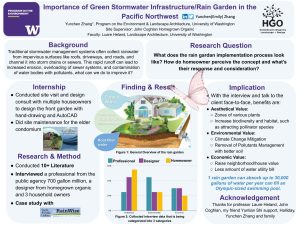Importance of Green Stormwater Infrastructure/Rain Garden in the Pacific Northwest
The understanding of nature-based solutions through green infrastructure, especially rain gardens, is an invaluable strategy to our environmental reality as it gives more opportunity for the Great Seattle Area to improve its resiliency on rainfall event and city runoff on a scale that is not feasible through conventional stormwater management (gray infrastructure) alone. The research of collecting responses of rain gardens as a means to influence consciousness and decision making in the future urban green space development, however, is limited by concerns about education expertise, and further knowledge about the greatness of rain gardens. While progress has been made, the implication is still in need of improvement to maximize its impact on our management of environmental issues. During this time assisting with HomeGrown Organics visiting and conducting garden design for homeowners during the pandemic period, the author evaluated factors that influence a homeowner’s acceptance to install a rain garden with the assumption that an emphasis on those factors will enable the determination. To accomplish this, the research compile of 12 scholarly peer-review papers with the key world concentration of climate adaptation, benefits and well-being rain garden cases that have been successfully done by public agencies previous to on-site research as a way to evaluate their level of application. I then collected the positive and challenging aspects of the homeowners, professionals, and public agency officer’s reaction and administered 3 face-to-face interviews through both online meeting and in person form around 20 minutes, which allowed interviewees to answer in depth about their perception of the GSI concept. With this information, I found rain gardens increase water quality, increasing urban biodiversity, enhance property value, bolstering physical and mental well-being and create sense of neighborhood worthy of land-planning investment, detailed reference materials, and multiple meetings to increase the consistency and quality of the data produced and therefore bolster the impact of the field.
